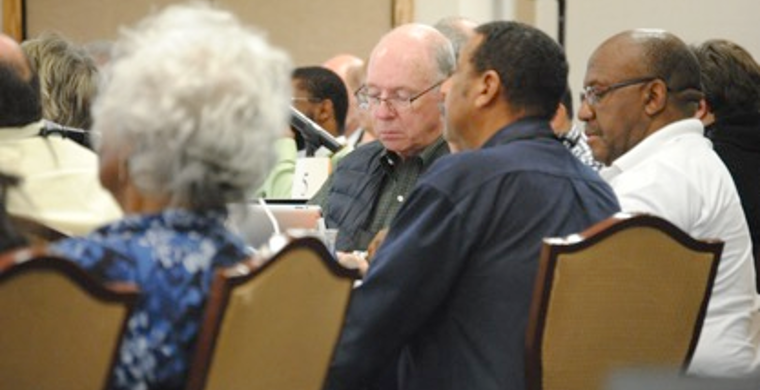Episcopal Church Center Staff Prevails on Secrecy
By G. Jeffrey MacDonald
THE LIVING CHURCH
http://www.livingchurch.org/staff-prevails-secrecy
November 19, 2015
Executive Council's professed transparency principle faced a test Wednesday in the final plenary session of the new governing board's four-day meeting. Members had just finished orientation when they experienced the challenges of acting independently Episcopal Church Center staff.
At issue was a resolution (FFM 019) to authorize housing allowances in particular amounts for 20 staff members, including new Presiding Bishop Michael Curry and Chief Operating Officer Stacy Sauls. Under the federal tax code, housing allowances allow clergy to pay less in taxes than if they take all their compensation as salary.
The Joint Standing Committee on Finances for Mission approved the specific housing allowance amounts and recommended that the council do the same. But when the resolution reached the floor, all the amounts were blacked out on the projection screen. They were also blacked out on versions distributed to reporters.
"I'm puzzled that we talk so much about transparency at the beginning of the meeting, and now suddenly we're trying to hide information," said the Rev. Nathaniel Pierce of the Diocese of Easton. "I'm troubled by being asked to vote in favor of a financial document required by the IRS where all the numbers are blacked out. I'd vote against it just on principle. Don't ask me to vote on it if you're going to black out the figures."
The Rev. Canon Mally Lloyd, member of the finances committee, asked what had happened to the resolution after her committee voted on it. She wondered why it was appearing on the floor in a new form.
"Our intention was to display the numbers," Canon Lloyd said. "I'm not sure why they're blacked out here."
Pierce also questioned why resolutions are redacted after they are voted out of a committee.
"I'm not sure why the figures are being blacked out," Pierce said. "The first time a resolution came through for the consent calendar, all the figures were blacked out. Then the resolution was redone and all the figures came through -- not blacked out. Now they're blacked out again. I don't understand why we're going back and forth on that."
Lloyd told members they could find the resolution with dollar figures intact on an extranet site restricted to council members.
Members of the council continued to raise questions. Some said their congregations publish compensation figures for all clergy, as do at least two dioceses: Massachusetts and North Dakota. One member asked why housing allowance amounts for church-center clergy are hidden from the public while those of local clergy are not.
Staff spoke during the debate to defend the process of redacting resolutions en route to the floor, including blacking out figures.
"An individual parish isn't publicized beyond the vestry that I'm aware of," said N. Kurt Barnes, treasurer and chief financial officer. "But here, we publish everything across the church and across the country."
The debate came at the end of a four-day meeting in which a number of sessions were closed to the public and concerns about confidentiality rose to the fore.
Wednesday's session began with an announcement that General Convention staff had found a tape recorder running beneath a table where Presiding Bishop Michael Curry sits, and instructions for everyone to search under their tables for hidden recording devices. Council members found no additional devices.
The entire council declared a rare executive session on Wednesday and met privately for slightly more than an hour. Press and certain staff were required to leave the meeting room and were barred from the half of the dining room that abuts the meeting room. Staff members clustered observers in a far corner of the dining room and made sure they stayed there.
The stated reason for executive session was to discuss personnel matters and issues in Haiti, but the council reportedly also talked about another topic: the Diocese of Cuba's declared interest in reconnecting with the Episcopal Church, according to sources who were in the room. According to Robert's Rules of Order, a body must make public the reason for going into executive session.
Earlier in the four-day meeting, at least two joint standing committees went into executive sessions in which no reporters were allowed. The commission on governance and administration declared one to discuss legal matters, and the commission on world mission declared another to discuss Haiti. Rebuilding St. Vincent's School for handicapped children in Port-au-Prince was among the topics discussed behind closed doors when the entire council went into executive session, sources said.
The resolution on housing allowances ultimately passed by a voice vote. As the council voted, numbers remained blacked out on the projection screen and remained available only to members of executive council on the extranet. The council adjourned shortly thereafter without releasing the resolution in its final form to the press and public.














